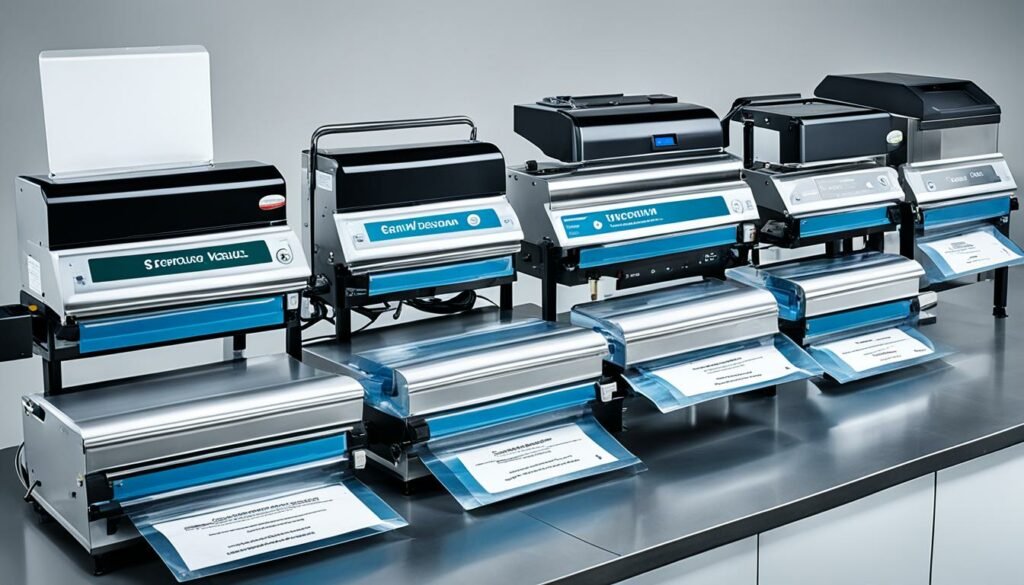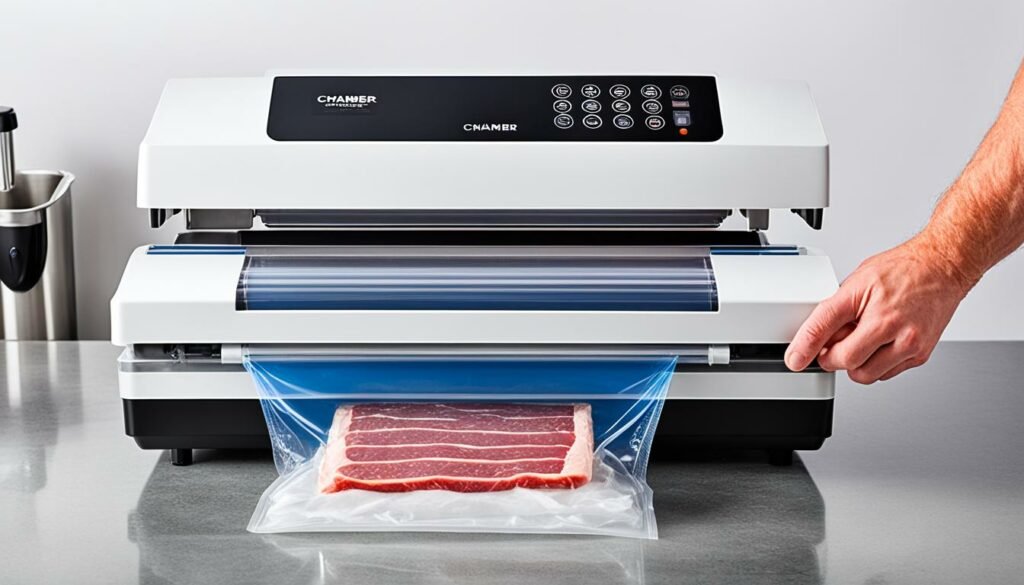Why invest in a commercial vacuum sealer for your kitchen? It all boils down to making your kitchen more efficient and innovative. Commercial kitchen vacuum sealers help extend food life, cut down on waste, and make your daily grind smoother. With so many options out there, picking the right machine is key.
This vacuum sealer buying guide is your detailed map through the tech jungle. We’ll cover how these machines work and the benefits they bring. Whether you want to up your productivity or try out sous-vide cooking, this guide has everything you need.

Understanding Commercial Vacuum Sealing Machines
Commercial vacuum sealing machines are key for keeping food as fresh as possible. They remove air from packaging. This keeps food good longer, saves time, and lets you try new cooking methods like sous-vide.
What is a Vacuum Sealer?
A vacuum sealer takes air out and seals food in a tight package. This keeps food from spoiling quickly by creating an airtight environment. There are many sizes of vacuum sealers to fit different kitchen types.
Benefits of Vacuum Sealing
Vacuum sealing brings many advantages for kitchens, such as:
- Longer shelf life for products.
- Better flavor and food quality.
- Less food waste means saving money.
- Sous-vide cooking can be done easily.
- Quick prep and portioning.
How Vacuum Sealing Works
To know how vacuum sealing works is important for anyone in the food industry. Food is put in a special bag. Air is sucked out and the bag is sealed. This stops bad things like bacteria from growing and makes food last longer. Different vacuum sealers have special features to work with all kinds of food.
| Feature | Description |
|---|---|
| Automatic Operation | Makes sealing easy with just one press. |
| Adjustable Suction | You can change the power for different foods. |
| Pulse Vacuum | Gives you manual vacuum control. |
| Integrated Cutter | Cuts bags to the size you need neatly. |
Types of Commercial Vacuum Sealers
In the commercial vacuum sealing world, knowing about the various *vacuum sealer types* is key to proper decision-making. The main groups are chamber vacuum sealers and external vacuum sealers. They offer different advantages, serving various business sizes and needs.
Chamber Vacuum Sealers

Chamber vacuum sealers handle large volumes and are great for liquids. They seal by placing the bag inside a chamber, keeping pressure even for a solid seal.
- Great for packing liquids without leaks
- Efficient for large-scale work
- Creates strong, consistent seals
External Vacuum Sealers
In comparison, external vacuum sealers suck air out of the bag from outside the machine. They’re simpler, making them better for those not often sealing liquids. This also makes them less complex than chamber models.
- Best for smaller jobs
- Simple to use and keep up
- More portable and versatile
Comparing Chamber and External Vacuum Sealers
To choose between chamber vacuum sealers and external vacuum sealers, understanding their differences is essential. Here’s a comparison focusing on vital features and functions:
| Feature | Chamber Vacuum Sealers | External Vacuum Sealers |
|---|---|---|
| Volume Capacity | High | Low to Medium |
| Handling Liquids | Excellent | Limited |
| Seal Quality | Reliable and Strong | Good |
| Maintenance | Moderate | Low |
| Portability | Less Portable | Highly Portable |
Ultimately, choosing the right vacuum sealer type depends on your packing needs, budget, and operations. By grasping the differences between chamber vacuum sealers and external vacuum sealers, you can find what fits your business best.
Factors to Consider When Buying a Commercial Vacuum Sealing Machine
Before you buy a commercial vacuum sealer, think about a few things. Consider your packaging needs, how much you need to seal, your budget, and any extra features you want.
Packaging Needs
Think about what food you will seal and how much you need to seal. Chamber vacuum sealers are best for sealing liquids. External vacuum sealers are good for everything else, and they cost less. To know which type you need, look at your business’s requirements. For more help, check out a vacuum sealer buying guide.
Productivity Requirements
How often you will use the sealer is key. Chamber sealers are great for big jobs. They prevent freezer burn and keep food fresh longer. If you’re just starting, a bar-style external sealer might be enough. It’s important to consider what your business needs for the best choice.
Budget Constraints
Chamber sealers are more expensive but worth it for large-scale jobs. On the other hand, external sealers cost less upfront. Keep in mind, though, the bags for external sealers can be pricey. Focus on what your money can get you to make the right choice. Looking at a vacuum sealer buying guide can help with budget planning.
Additional Features
Don’t forget to check for extra features that could make your job easier. Some chamber sealers work with both liquids and solids, which is very flexible. However, they might be more expensive. Out-of-chamber sealers are cheaper but don’t handle liquids well. It’s easier to maintain wet pump chamber sealers than dry ones. Paying attention to these details can make a big difference in your machine’s performance over time.
For tips to keep your vacuum sealer in top shape, check out a vacuum sealer buying guide. It can help you with maintenance and keep your machine running well for longer.
Buying Guide for Commercial Vacuum Sealing Machines
Need help buying a commercial vacuum sealer? It’s key to pick one that meets your business’s needs. Think about the bags it can use and how to keep it running well. This will help your machine last longer and work better.
Choosing the Right Type
Choosing the right sealer depends on your kitchen’s needs. Chamber sealers work great for big kitchens. They seal many items at once, including liquids. External sealers are better for small kitchens. They seal one bag at a time but do it quickly and easily.
Considering Vacuum Bag Materials
Know about the bags you need for the best results. There are perforated and smooth bags. Perforated bags work with external sealers, letting air flow out. Smooth bags are for chamber sealers. They make a tight seal, good for bulky or wet foods. Choosing the right bag type makes sealing better.
Maintenance Tips
Keeping your sealer in good shape is key for its long life. If your sealer has a wet pump, change the oil often to keep it working right. Don’t forget to clean the sealer’s bar and check for any damage. Following a regular maintenance plan protects your investment. It also keeps your sealer working reliably.
Conclusion
Vacuum sealing is changing the game for foodservice business owners. It offers many benefits, from keeping food fresh to saving money. This guide aimed to help you choose the best commercial vacuum sealer by looking at its types and functions.
When picking a vacuum sealer, understanding the difference between chamber and external sealers is key. So is knowing what your business needs. Think about the packing, how much you need to seal, your budget, and any bonus features. Choosing the right one will make your business more efficient and keep your products top-quality.
Also, remembering to take care of your sealer and use the right bags is important. It helps you get the most out of your machine. A commercial vacuum sealer can really change things for your business, both right away and in the long run. With this guide, you are ready to make a smart choice. Good luck with your sealing adventures!
FAQ
What is a Vacuum Sealer?
A vacuum sealer is a tool that takes the air out of a package and seals it. This keeps the food tasting fresh and looking good. It’s perfect for saving perishable items and is a big help in places that cook a lot of food.
What are the benefits of vacuum sealing?
Vacuum sealing keeps food fresh longer. It is good for saving money by buying in bulk and dividing the food into portions. It also makes cooking methods like sous-vide easier.
This process can also increase a kitchen’s earnings through new food products.
How does vacuum sealing work?
To vacuum seal, the air is taken out from the package. This creates a tight seal that stops the food from spoiling. It’s a great way to keep food fresher, longer.
What are the types of commercial vacuum sealers?
The two main commercial types are chamber and external vacuum sealers. Chamber sealers are good for foods with lots of liquids and big batches. External sealers work well for smaller jobs and less liquid.
How do I choose the right vacuum sealer for my business?
Think about your packaging and how many packages you need to seal. Also, what your budget is. Look into what extra features you might need.
Decide if you need a chamber or an external sealer. This depends on how you do your work.
What factors should I consider regarding vacuum bag materials?
Choose bags that work with your sealer. Chamber sealers like smooth bags, while external sealers need bags with textures. The thickness of the bags also affects how well they preserve food.
What are the maintenance tips for a vacuum sealer?
To keep your sealer in top shape, handle it correctly and change the oil often. Always clean it the way the maker says.
Doing this will make your sealer last longer.
How can a vacuum sealer improve my kitchen’s efficiency?
A vacuum sealer makes preparing food easier by letting you do a lot at once. It cuts down on waste, saves money when buying in bulk, and makes advanced cooking methods simpler.
Are there any specific applications for vacuum sealing in commercial kitchens?
There are many uses for vacuum sealing in a big kitchen. It’s great for keeping ingredients fresh, marinating meat, and cooking sous-vide. You can also use it to pack meals to go or sell in a store.
This tool really increases what you can do in a kitchen.
